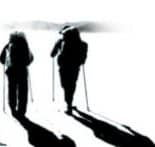
Some sound advice from the introduction of Ray’s excellent ‘The Survival Manual’. If you have not caught up yet with Ray, you should. He is the original of those poor copies such as Bear Grylls having trained the SAS and others for many years in survival skills. You can get a taste of his style here: https://www.youtube.com/user/RayMearsBushcraft or purchase his books and DVDs here: https://www.raymears.com/
- ‘Don’t challenge Nature, challenge yourself: Occasionally you will hear people talking about beating the elements by conquering a mountain or crossing an ice cap or some such brave deed. The truth is that the challenge is internal. Have you the skill? Can you overcome your fear? No one can beat the elements; all those who fail to heed the warning signs or have the stupidity to press ahead regardless, die. Instead of taking unnecessary risks challenge yourself to know when to turn back; learn to be more skilful; above all challenge yourself to better understand the way nature works.
- If you’re roughing it, you’re doing something wrong: Any fool can be uncomfortable, you gain no points for carrying a heavy backpack, or for any deeds of self-imposed endurance. While you may train for an expedition by roughing it, if there is a way of making yourself more comfortable, without the effort becoming a disadvantage, do so. In emergency situations in particular, just a small amount of hardship can prove to be fatal once your level of morale has dropped.
- Always give z00% effort the first time: Whether shelter building, firelighting, or whatever, if you don’t set about it in the right way the first time you are wasting your energy and will simply have to start from scratch again..
- Aim to achieve maximum efficiency for the minimum effort: To work you need energy; for energy you need food. In the outdoors finding food is work. When you gather your firewood for your fire do you carry large armfuls to the log pile or do you only fill your hands?
- Never pass by an opportunity: This is very important. As you travel along, should you find suitable water, food or firelighting materials, gather them as you pass since you may not have the opportunity later when they are needed. This is particularly true of fire building materials where by the end of a day’s travel it may be raining or have rained earlier soaking the available tinder. Many of my old shirts and jackets have birch bark pieces in the pockets that I gathered some years ago now.
- As far as you can, adapt your expectations to a level which you can meet given the circumstances: If you cannot build a large comfortable shelter, be satisfied with a small shelter. If there is not a wide variety of wild foods available to you, be grateful for the one type you can eat. Make your psychology work for you. Be realistic—make yourself comfortable but do not overwork yourself to achieve this: it’s no use building a palatial shelter if you then collapse with exhaustion inside it. But also do not underestimate what you can achieve.
- Only eat that which you have positively identified as edible: Do not trust taste tests or in any way experiment with unfamiliar plants or other materials for use as food. The only real way to eat in safety and confidence is to learn what can be eaten and just how to prepare the food before you set out. If this seems like hard work you should not be eating wild foods.
- Suspect all water as being infected: Even the cleanest, coolest most alluring water may well be contaminated; you cannot tell at a glance. Boil or purify all water—check in particular for signs of chemical pollution, this may be concentrated by boiling!
- The state of your fire is directly proportionate to your level of morale: Whatever your level of morale, if you can light a fire it will be raised, but if you fail it will plummet like a stone. If you are not confident of your ability to light a fire in the rain it may well be better to wait until the rain stops before trying.
- Whenever gathering your resources use natural selection as your guide, this is the `way’ of nature: Leave the strong, harvest the weak; when gathering food you should always leave a proportion of healthy plants, shellfish or whatever to continue the line. By this lore stronger healthy creatures will have the best chances for survival and thereby proliferate in the future.
- Take only memories leave only footprints: Wherever possible minimise your impact upon the natural environment, and always aim to leave a campsite in a better state than you found it.
- Be fit, able to swim and do not give in: Every single skill or technique which follows is easier to learn and master if you are fit. The outdoors is filled with risks and the danger of unpredictable circumstances. Your fitness may well be your last line of defence in such circumstances.
These lores are the guide to successful backwoodsmanship, but in writing them I have assumed that you are able to carry out basic first aid. If you cannot you should attend a course run by an organised body such as the Red Cross. Almost invariably every outdoors man or woman will have recourse to such knowledge at some time or another. One aspect of first aid of particular relevance in the outdoors is an understanding of how hot and cold environments affect your body, these are problems you will face on a regular basis.’


Looking for effective advertising that isn’t full of crap? Sorry to bug you on your contact form but actually that was the whole point. We can send your advertising copy to sites via their contact forms just like you’re getting this message right now. You can target by keyword or just fire off mass blasts to websites in the location of your choice. So let’s assume you would like to send an ad to all the web developers in the United States, we’ll grab websites for only those and post your promo to them. As long as you’re advertising some kind of offer that’s relevant to that type of business then you’ll receive an amazing response!
Shoot an email to sarah1916eva@gmail.com for the details
Thanks Nadia but I don’t do any advertising. Cheers, Steve.
The premise behind having entries marked “survival kit ” is faulty. No hiker of any sort would find such a “kit” of any value to the extent it goes beyond equipment they would in any case carry. To imply otherwise is a disservice to the uninformed. Otherwise I enjoy your blathering web site. Thanks!
Well, I certainly don’t – but there are some things you certainly should always have. If labeling helps to remember…Blathering? Thanks? Cheers, Steve.